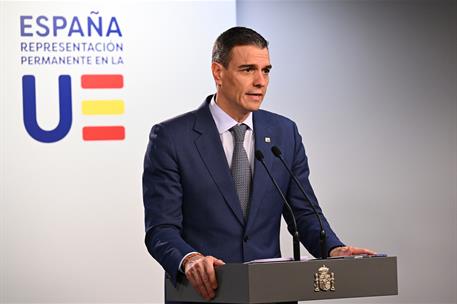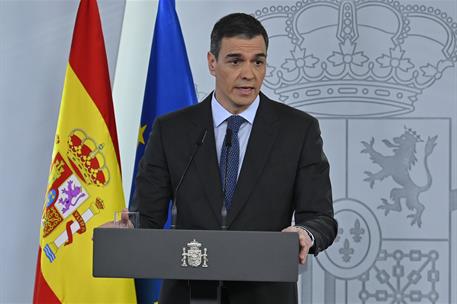Appearance in Lower House of Parliament
Pedro Sánchez: "We will comply with the EU without touching a single cent of social spending"
President's News - 2025.3.26
Lower House of Parliament, Madrid
The President of the Government of Spain, Pedro Sánchez, during his appearance in the Lower House of Parliament
The President of the Government of Spain, Pedro Sánchez, argued in the Lower House of Parliament that Spain will comply with the commitment made to the European Union (EU) in 2014 to allocate 2% of Gross Domestic Product to investment in security and defence "out of Europeanism and responsibility" and assures that this additional effort in both areas will not be made to the detriment of the welfare state.
The head of the Executive appeared before the plenary session of the Lower House of Parliament to report, at his own request, on the EU's new geopolitical scenario and the conclusions of the European Council held on 20 March in Brussels, where European leaders addressed the crisis caused by the war in Ukraine.
"We can no longer assume that others will protect our skies, our infrastructure or our borders. We will have to do it ourselves", warned Pedro Sánchez, who stressed the importance of European unity. "We are facing a new crisis provoked by the return of Russian imperialism and a Copernican turn in US military and economic policy. Two tectonic shifts that require us to complete our integration in foreign policy, security and defence and competitiveness to grow further through greater economic union.
Investing in security and welfare: funding instruments
The President recalled that Europe lacks a common security and defence policy and warned of the urgency of addressing this shortcoming. "We must overcome the blockage of melancholy and adapt to the new situation", said Pedro Sánchez, who also reiterated Spain's commitment to this task.
The President of the Government of Spain, Pedro Sánchez, appears in the Lower House of Parliament
"We will comply with the European Union. Because there is no one like Europe to look after Europe. We will increase investment in security and defence. But we will do so without touching a cent of social or environmental spending," continued the head of the Executive, who exemplified this commitment by pointing to the €10 billion increase in state investment in security, alongside the €120 billion increase in investment in public services and social benefits.
In this context, President Sánchez confirmed the Executive's support for the measures presented at the last European Council by the President of the European Commission, Ursula von der Leyen, to strengthen the joint response of the Member States in situations like the current one, among which he mentioned the SAFE Europe fund, the escape clauses or the strengthening of the European Investment Bank, measures among which the Government "finds lacking" - and has conveyed this to the European Council - a system of transfers similar to that of the NextGeneration funds.
According to the president, these financing mechanisms will be specified in the coming weeks, and "only then" will the government be able to know what European resources it has available to define precisely what the state's investment path will be to reach the planned 2% of GDP.
More unity in the face of new threats: European Army
Pedro Sánchez stressed the importance of a planned and adjusted investment for the EU's approach to the new context: "How much to invest and how to finance that investment is only part of the debate needed to create a European security and defence union. Because what is really important is not how much we invest, nor how we finance that investment; what is really important is whether we invest better and whether we invest together as Europeans.
The President of the Government of Spain, Pedro Sánchez, during his appearance in the Lower House of Parliament
In addition to the aforementioned financing mechanisms, the president spoke of the need to create a European Army - "armed forces made up of 27 countries under the same flag" - and joint preparation for new threats: "Now, the enemies of Europe and democracy are using other physical and digital weapons.
Pedro Sánchez specified here that the challenges and threats that Spain faces "are somewhat different from those of Eastern Europe", citing among them the climate emergency, the fight against organised crime and the mafias that traffic in people, and international terrorism, which is increasingly present in the Sahel.
Plan for the security and defence industry
To coordinate the response to these security challenges," explained Pedro Sánchez, "the government will continue to work on updating the equipment of the armed forces, modernising airspace protection systems and developing capabilities to block cyber attacks.
"We will make sure that the fruits of this industrial effort that we have to make benefit Spain and Europe, that it serves to create jobs and companies," continued the President, who announced at this point the launch before the summer of a National Plan for the Development and Promotion of Spanish Security and Defence Technology and Industry.
This plan, he said, will draw on the experience acquired thanks to the Recovery Plan to concentrate the bulk of the additional investment required to comply with European partners and channel it through public-private partnership programmes that will drive a new technological and industrial leap in Spain. "The aim is for Spain to contribute to and benefit from this stimulus, but to be faithful to our priorities and principles," he added.
Economic integration versus tariffs
The President of the Government of Spain, Pedro Sánchez, with the First and Third Vice-Presidents, María Jesús Montero and Sara Aagesen, during his appearance in the Lower House of Parliament
As the second great task pending for the European Union in the new international scenario, Pedro Sánchez pointed to the completion of economic integration. In this context, the president described the imposition of tariffs announced by the new US Administration on all products from the EU as "unfair and unjustified measures", and Pedro Sánchez called on the US Administration to reconsider and engage in dialogue to "stop this nonsense".
"We do not want a trade war, but we are prepared to fight it: the Spanish government is negotiating a proportional, intelligent and united response with the EU institutions and the rest of the Member States", he assured. Thus, the executive has designed a national contingency plan to help the sectors that could be most affected by the tariffs, and continues to work on two main measures. Firstly, to further the diversification of Europe's trade links with the outside world, for which he alluded to the potential role of Asian and Latin American partners, and to "shore up" the EU-Mercosur agreement. On the other hand, he emphasised the importance of working on the consolidation of the Single Market.
Pedro Sánchez stressed that the last European Council approved a package of measures aimed at tackling some of these tasks, such as the creation of Community savings and investment products or the development of a horizontal internal market strategy. At the same time, the government is negotiating to push forward the Savings and Investment Union, the Banking Union, energy integration and the digital euro.
Properly implemented, he said, these measures "could help us finally end Putin's energy war and reduce the negative impact of US tariffs by 50 to 100 per cent". Spain also added to these initiatives the proposal to create a European Competitiveness Laboratory to accelerate the implementation of innovative and tangible solutions.
Towards a common foreign policy: defending multilateralism
During his speech, the head of the Executive also referred to the need to integrate European foreign policy. "The Spanish government's position is clear and forceful: now that other powers are retreating or undermining multilateralism, Europe must commit itself even more to resolving the great global challenges," he said.
In his plea for multilateralism, Pedro Sánchez listed as necessary issues a renewed commitment to human rights and international law; more participation in development policies; and strengthened support for the United Nations and other multilateral institutions. "Only in this way will we maintain peace in the world. With solidarity and diplomacy. This must be Europe's foreign policy," he says.
The President of the Government of Spain closed his speech by insisting on the need for European unity to influence a multipolar world: "It is time to share even more sovereignty and strengthen EU institutions", said Pedro Sánchez, who highlighted the role of his government in this task, emphasising that the country "is in a position to play a leading role in this new pro-European drive. On this occasion, Spain is also ready to lend a hand. For the good of Spain and Europe", he concluded.
Non official translation








